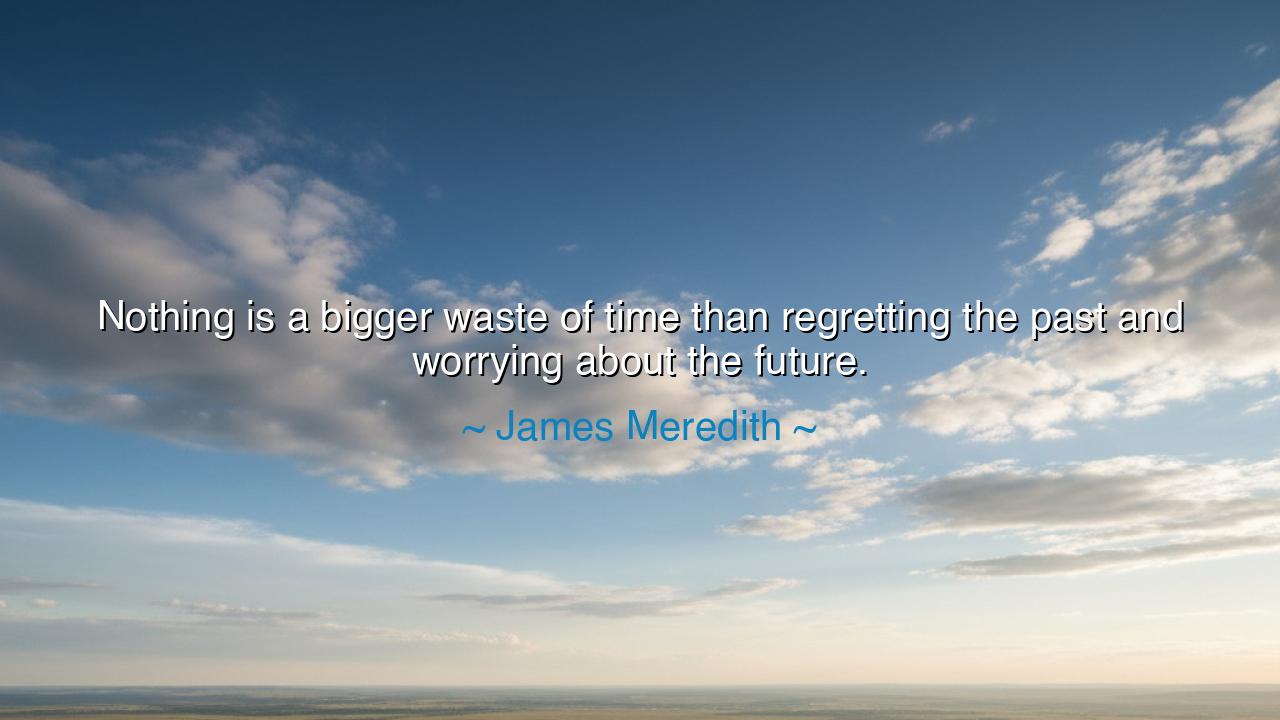
Nothing is a bigger waste of time than regretting the past and
Nothing is a bigger waste of time than regretting the past and worrying about the future.






In the ever-flowing stream of time, there are two mighty forces that pull at the hearts of men: regret for the past and fear of the future. These forces are not merely distractions—they are shackles that keep the soul from moving freely, from embracing the richness of the present moment. James Meredith, a figure who faced the harsh winds of adversity and came out stronger, once shared this profound truth: "Nothing is a bigger waste of time than regretting the past and worrying about the future." These words speak to the heart of human experience, for the past is but a shadow, and the future, though full of possibility, has not yet come to pass. The only true power we hold lies in the present.
The wisdom of the ancients is clear on this matter. The past, with all its victories and failures, is gone—it cannot be changed. To dwell in regret is to waste precious energy on something that no longer exists. The future, on the other hand, is a land we have yet to walk. To worry about what may or may not happen is to bind ourselves to a future that is as uncertain as the wind. As Marcus Aurelius, the Stoic philosopher and emperor, once said, “You have power over your mind, not outside events. Realize this, and you will find strength.” His words remind us that the present is the only time in which we can act, and it is only by being fully engaged in the now that we can shape a better future.
Consider the story of Nelson Mandela, who spent 27 years in prison, many of those years living with the bitter taste of regret for his inability to fight for his people. Yet, it was not in dwelling on his past suffering, nor in worrying about the future of a fractured nation, that he found his true power. Instead, Mandela chose to focus on the present moment, the choices he could make in each day, even within the confines of his prison cell. By embracing the now, he was able to transform the entire course of his life and the future of his country. His wisdom echoes the teaching that it is not the past or the future that shapes our destiny, but the choices we make in the present.
The poet Rumi, too, speaks to the power of the present moment, urging us to free ourselves from the chains of past regret and future anxiety. He writes, “Don’t grieve. Anything you lose comes round in new form.” Rumi’s words invite us to see that life is ever-changing, and that clinging to the past or fearing the future keeps us from embracing the fullness of life as it is. To regret the past is to deny the growth that has come from it. To worry about the future is to miss the lessons that the present offers. Life is not a linear path, but a river that flows—and it is only by being fully present that we can swim with the current, rather than struggle against it.
In our own lives, we must embrace the present with open hearts and minds. To spend our days mired in regret or anxiety is to miss the precious opportunities that lie before us. When we focus on the now, we release the grip that the past and the future have on us. We gain the freedom to act, to create, and to live fully. If we look at the wisdom of those who have achieved greatness, we find that they did not dwell on the past, nor did they obsess over what lay ahead. They lived with purpose, in the moment, and it was this unwavering focus that allowed them to achieve things beyond the ordinary.
The great Mahatma Gandhi offers us another example of this truth. Faced with the impossible challenge of leading a nation to freedom, he never allowed himself to be consumed by past injustices or the overwhelming uncertainty of the future. Gandhi’s strength lay in his ability to focus on what he could control in the present moment, whether it was a peaceful protest or a quiet moment of reflection. It was not the weight of regret or fear that guided his actions, but the clarity of his vision in the here and now. His life reminds us that by letting go of the past and the future, we unlock the power to shape the present and, by extension, our future.
The lesson for us is simple but powerful: do not waste time in the grip of regret or fear. The past is gone, and the future is yet to come. What we have is the present, and it is in this moment that we must act. Whether it is in our personal lives, our careers, or our relationships, it is the present that holds the key to everything we seek. As we embrace each day with intention and awareness, we begin to shape a future that is grounded in the strength and wisdom of the now. So, release the chains of past regrets and future anxieties, and live fully in the present, for it is here that all true power resides.






AAdministratorAdministrator
Welcome, honored guests. Please leave a comment, we will respond soon